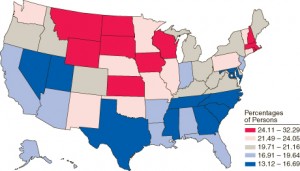As in the case of many other teen social behaviors, parents seem to learn about teen drinking when it comes to their children once it’s already gone on. Kids can be drinking and the next day you might never know. You may only find out about your child’s alcohol habit once you find a wine bottle missing, or a gin bottle filled not with its actual contents, but with water. It is important then to be vigilant and to teach children about the dangers of drinking, particularly underage drinking.
Drinking And Teen Drinking Statistics
The stats about American drinking show us why this is so. In 2008, a federally funded “Monitoring the Future” study showed that 43.1% of 12th graders had consumed at least one drink in the month before they were surveyed. For 8th graders, it was 15.9%, and 10th graders drank at a rate of 28.8%. Considering that many kids are learning to drive or driving in 10th grade, the percentage of underage drinking that occurs is all the more alarming. 14.4% of 10th graders describe themselves as having been drunk in the past month; 27.6% of 12th graders did the same (and 5.4% of 8th graders).

% of Teens Between 12-20 Reporting Past Month Binge Alcohol Use, by State: 2003 and 2004
Parental Control And Its Positive Effects
A study conducted by the National Institute of Drug Abuse (NIDA) proved that parental monitoring can reduce high school drinking. And this was also linked with a lower proportion of drinking in college. In the study that involved 1200 college students questions were asked about college life and the level of teen drinking. Additional information was also collected about the level of control that was exercised by parents in school. The connection between parental supervision and relatively lower levels of drinking were obvious irrespective of gender, race or religion.
Facts about Teen Drinking that Parents need to Know
More than 1400 college students in the age group of 18-24 die from alcohol related injuries including motor crashes. The figures for injury are as high as 500,000. About 70,000 college students a year become a victim of sexual abuse in the same age group due to the effect of alcohol and 400,000 suffer the consequences of unsafe sex. A quarter of teens have academic problems due to teen drinking. About 5 percent of these teen drinking issues end up involving the police.
How can Parents Manage Teen Drinking?
The first thing that parents need to do when they are combating teen drinking is to be aware of the signs. Sudden lower grades, irritability, lack of interest in socializing, campus trouble and mood swings are some signs that parents need to be aware of. It is important that parents do not get into a blame game or a witch hunt to try and find the reasons for teen drinking. But there are ways to combat a teen drinking problem. If your teen has an alcohol problem, you can use an alcohol test to see if they have been drinking (they work just like a breathalyzer, but are a lot cheaper). Some steps that parents can take are listed here:
– Speak to the Dean or the high school/college counselor.
– Speak to the teen about the drinking and let them know that you are aware of the issue and are supportive of them, but not the drinking.
– Speak to their friends and understand the situation that they are in and how critical the teen drinking is.
– It is never too late to start the process of open communication. Come out clean with your teen about the drinking issue and other things if you have not been communicating
– At all times remember that the teen drinking is a reaction due to some issue that your teen may be having – with depression, or peer pressure, or alienation. Your teen is growing up and has different social needs. Understand those and think of when you were a teen before you react to the situation.
– Article by Anne Hamilton




